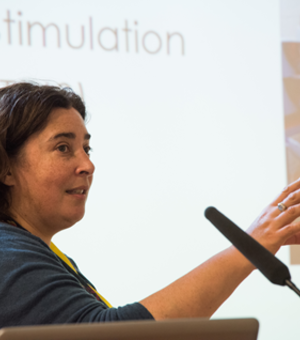Kate Watkins
Kate Watkins studied Natural Sciences at Cambridge University. She trained in neuropsychology at Great Ormond Street Hospital for Children and the Institute of Child Health while also studying for a Masters in Neurological Science and a PhD in Cognitive Neuroscience at UCL. During her doctorate, she used neuropsychology and MRI brain imaging to study the KE family who had a mutation in FOXP2 affecting speech production. She moved to the Montreal Neurological Institute, McGill University for a postdoctoral position where she learned to use brain stimulation and continued her imaging work looking at speech production and perception. After returning to the UK, she obtained position in the Department of Experimental Psychology and St. Anne’s College where she teaches undergraduates and heads the Speech & Brain Research Group. Her research focuses on speech and language disorders, specifically developmental stuttering and more recently developmental language disorder (DLD). She also uses brain stimulation to explore the interaction between speech production and perception systems and as a potential treatment to enhance fluency in people who stutter. She is also interested in the brain's capacity to reorganize and repurpose itself, which she investigates in the context of studying language and auditory processing in people who are congenitally blind.
About Dorothy:
“I vividly remember the first time I heard Dorothy give a talk. It was at City University and about dimensions of language versus social/pragmatic abilities and classifications of developmental disorders. I was blown away but had no idea how much this wonderful scientist would influence my later career, that I would have the privilege of doing science with her and that we would become firm friends. During my PhD, I visited Dorothy in Cambridge to show her some of my data. I remember her taking my data stick and loading the file into SPSS and running an analysis there and then in front of me. Knowing Dorothy far better now, I realize that this is exactly what she loves doing and that she constantly challenges herself to learn new analyses and statistics. My next interaction with Dorothy was when she phoned me very apologetically to tell me I was unsuccessful in applying for a postdoc position with her…. But she couldn’t escape that easily ;-)…. When I was given an office in the department, I was thrilled to be two doors down the hall. This proximity fostered our later collaborations including co-supervision of students and postdocs, which have been a highlight of my time in Oxford. Even when the closure of the Tinbergen meant we were forced apart and have since worked in separate buildings, we maintained a very fruitful collaboration culminating in our recent BOLD (Brain Organisation in Language Development) study. We scanned a meaningful sample of children with DLD, which was something we wanted to do for ages and finally completed before the events of 2020. Under Dorothy’s influence, we have also fully embraced open science approaches producing one of the first registered reports of a functional brain imaging study. On a personal note, I was very lucky to have support from Dorothy and Pat during some difficult and scary times. I will miss the work chats and the scientific collaboration but I know that our friendship and their support will continue post-retirement and I am very much looking forward to more of that!”



